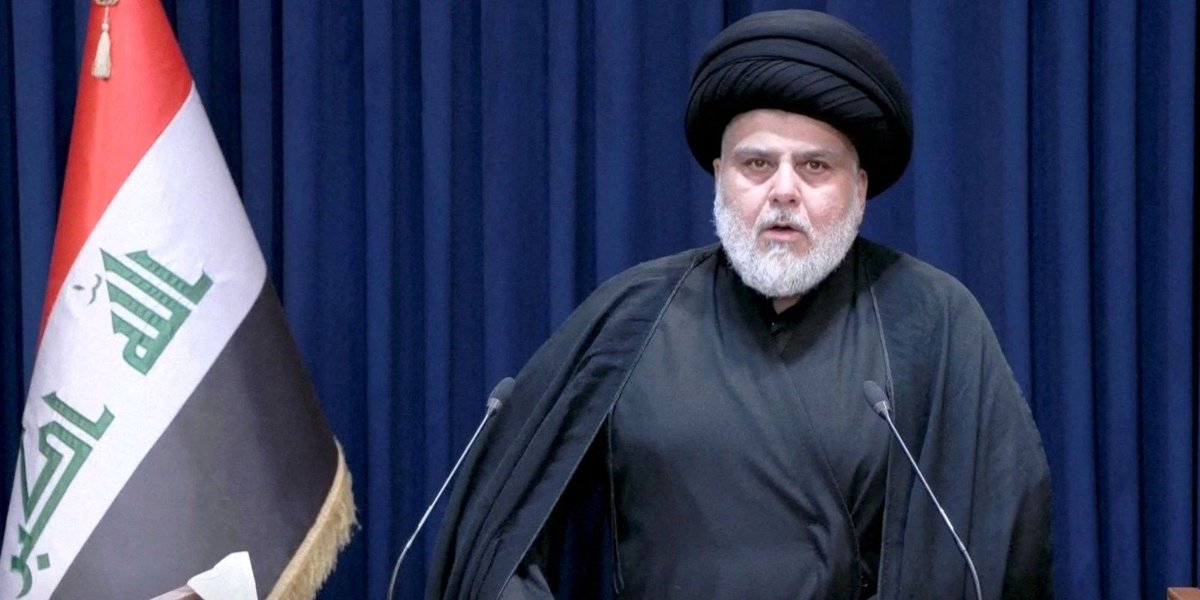IRAQI POLITICIAN MUQTADA AL-SADR RESIGNED, CHAOS FOLLOWED
By Buddy Blouin
COMMENT
SHARE

Advertisement
News for Iraq sadly continues to look bleak, as political unrest has been the main theme of 2022. There are many factions fighting for influence in what are now failed elections, with those factions even enduring in-fighting. The conflict continues to present an issue for the Iraqi people, but it’s also a problem for the thousands of U.S. troops still in the area serving. Muqtada al-Sadr is now resigning from politics, but some are unsure if it’s not just another political move or a legitimate attempt to bring peace to the nation.
Read next: The Job of a Combat Photographer Is Art Meets Service
Who Is Muqtada al-Sadr?
An Iraqi Shi'i cleric and leader, Muqtada Sadr is the son of Grand Ayatollah Muhammad Sadiq al-Sadr, one of the biggest Islamic figures of the late 20th century. Muqtada al-Sadr’s net worth is estimated to be between $1 million and $5 million. Al-Sadr has been accused of having involvement in the assassination of Abdul-Majid al-Khoei in 2003, but it has never been proven. Today, he's a leading nationalist figure in Iraq, calling for the West and Iran to keep their influence out of elections.Muqtada al-Sadr Resignation Sparks Violence
Muqtada al-Sadr's resignation from politics has sparked violence throughout Iraq. In a move that was supposed to bring peace and stabilization to the region, the resignation has ironically inspired even more unrest. Though not everyone supports al-Sadr, his followers are committed to his cause. Those who were involved in politics were asked by al-Sadr to abandon them two months ago, and now he himself looks to be leaving, too, shuttering his political offices throughout the area. Iran is now looking to host a dialogue with al-Sadr as his supporters continue to burn tires, block roads, and protest throughout Iraq. It remains to be seen what will come from such talks, but Iran will be working to avoid losing any influence it has in the country.Advertisement
Calls To Move Up the Iraq Elections 2022
Snap elections are when elections occur in a parliamentary system faster than normally scheduled. Muqtada al-Sadr has called for such action due to the ongoing political unrest taking place in Iraq. Iraq news cycles have had plenty of content to draw from since the October elections in 2021. Since the Council of Representatives of Iraq hasn’t been able to stabilize the country through a cohesive government or elect a new President, there's been turmoil throughout the country. The election sparked violence in Baghdad, Iraq. Combined with an attempted assassination of Prime Minister Mustafa al-Kadhimi, things continued to go from bad to worse as time moved on. In November 2021, Muqtada al-Sadr looked to consolidate the nation and ascend as its leader. Emerging from this power vacuum on top has proved to be difficult, as months of conflict have left hundreds injured and at least 23 dead. Sadr is now resigning from politics as a way to stabilize the country two months after asking members of his movement to do the same. Despite securing 73 of the total 329 parliamentary seats, his nationalist movement is still not enough to bring peace to the state.Muqtada al-Sadr Unrest Is a Lit Match Thrown Into a Tinderbox
As with any geopolitical issue, there's a lot going on. For starters, fighting factions within the same religious belief systems can’t get along, and there are outside influences from the West and Iran, further complicating the situation. Sadr and his party disagree with outside influence and remain as conservative nationalists working toward unifying Iraq in such a manner. This is one of the main sources of conflict. But anywhere you have multiple influences trying to make politics of a third-party work, there's bound to be resistance. Considering the complexities of the Middle East, it’s now that much more complex. The United States still has around 2,500 troops stationed in Iraq. The Biden administration made headlines when it pulled troops out of Afghanistan, but the American Armed Forces are still operating in Iraq, now, under even more chaotic conditions than in recent times. U.S. troops are still in Iraq helping fight the many warring factions that continue to try to replace ISIS after the group did the same following the dismantlement of al-Qaeda. There have been several missile strikes on the U.S. embassy in Iraq, and thousands of troops were sent to respond to an Iranian-backed attack on the embassy on December 31, 2019. War nearly broke out days later after U.S. forces killed Maj. Gen. Qasem Soleimani in Baghdad and sparked a retaliation that injured 110 troops at Al-Asad Air Base four weeks later. Groups such as Kait’ib Hezbollah are also supported by Iran, forcing the U.S. military to fight battles against such militias in Iraq as proxy wars continue in the area. Despite attacks, such as the highly publicized ninja bomb strike against al-Qaeda leader Ayman al-Zawahiri just outside of Iraq, it still affects troops stationed there. The political unrest in Iraq is only adding to the tension. Though Muqtada al-Sadr has retired from politics, some believe this could simply be a political tactic and not actually meant to bring peace to the region. Either way, it’s important to remember that these events are an all-too-present reality for thousands of American heroes fighting to keep us safe. Suggested read: A Full Guide to the PACT Act: How You and Your Loved Ones BenefitImage: Sky News
Join the Conversation
Written by
Buddy Blouin
Buddy Blouin is a Contributing Writer at VeteranLife.com
Buddy Blouin is a Contributing Writer at VeteranLife.com
Advertisement
SHARE:



